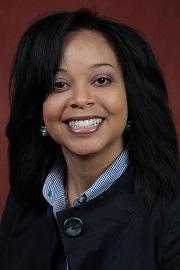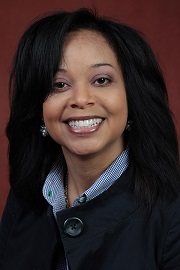FSU's MLK award goes to 'shining example' Brown Speights


January 2018
For the third time, a faculty member at the College of Medicine has received Florida State’s prestigious Dr. Martin Luther King Jr. Distinguished Service Award.
Joedrecka Brown Speights, associate chair of the Department of Family Medicine and Rural Health, received the award at FSU’s annual MLK commemorative celebration Jan. 16.
“Her style is strikingly reminiscent of Dr. King’s teachings and speeches, which she has studied for most of her life,” read a nomination letter from faculty colleague Heather Flynn. “She has an exemplary track record of scholarly and service work dedicated to the underserved, and has been recognized locally and nationally for this work.”
Brown Speights said she was elated and humbled by the award.
“My life, my parents’ and family’s lives, my friends, our world have been positively impacted by the ideals, leadership and sacrifice of Dr. King,” she said. “Receiving this Distinguished Service Award brings me honor and reminds me of the importance of operating in love, compassion, wisdom, knowledge, purpose and with tenacity. Love overcomes hate.”
Brown Speights received her Bachelor of Science degree at Florida A&M University and a degree in theology from Truth for Living Bible College. Then, at Emory University, she earned her M.D. She is board-certified in family medicine and a fellow of the American Academy of Family Medicine. In her career as a family physician, her clinical activities have been dedicated to underserved populations. She joined the College of Medicine faculty six years ago.
In her long nomination letter, Flynn also noted that Brown Speights:
- Organized three major, regional, maternal-child health equity conferences that brought together several community organizations and agencies, as well as FAMU and community members.
- Has contributed to the scholarly literature related to health issues among underserved populations.
- Has “single-handedly improved the reputation of FSU in this community by providing example after example of her generous and effective efforts to affect poor maternal-child health outcomes” that result from racism and poverty.
- Is a “shining example of King’s ideas and teaching in action through exemplary teaching, scholarly activity, community partnerships, service and clinical care.”
Brown Speights’ department chair, Daniel Van Durme, also wrote a letter supporting her nomination. Among the many points he cited:
• “She created and teaches a fourth-year elective course on Health Disparities and Health Equity–At Home and Abroad. This course teaches many of the core principles and underlying factors in health equity and then allows the senior medical students to explore the topic in more depth with a population of specific interest to them.”
• She “has a steady stream of students seeking her counsel. Her teaching evaluations are loaded with superlatives about her compassion, understanding and ability to engage students as active learners.”
At least one nomination came from the community rather than the campus. Miaisha Mitchell, executive director of the Greater Frenchtown Area Governor’s Revitalization Council, praised Brown Speights for effortlessly wearing the many hats required to address community issues effectively and compassionately.
“Imagine,” Mitchell wrote, “a Medical Doctor with a Doctorate in Theology who is a dedicated practitioner, an advocate for community-based participator research, a strong voice for women and children, a researcher and a Health Equity Global and National Institute Fellow who still manages to volunteer and take care of her family life.”
In his own letter of support, College of Medicine Dean John P. Fogarty summed up: “She is here at the FSU College of Medicine to improve the health and lives of others and to pursue an academic career of research and service to her community. She is the ideal nominee.”
Brown Speights shows no signs of slowing down.
“I want to continue to work with others collectively to make this world a better place for everyone regardless of the color of their skin or socioeconomic status,” she wrote in an email. “Health equity is achievable! Racial/ethnic disparities can be eliminated. This starts with love.”
In previous years, former College of Medicine faculty members José E. Rodríguez and Kendall Campbell received this award.

